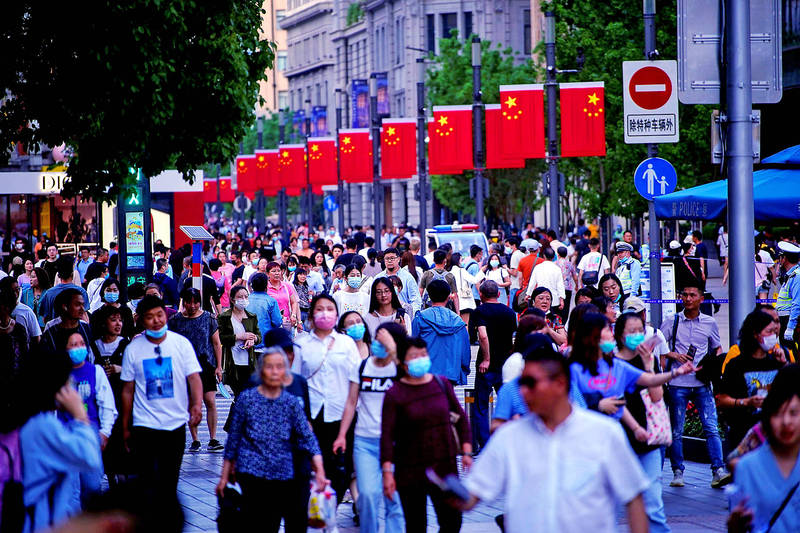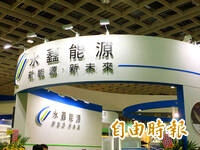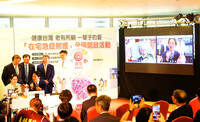《TAIPEI TIMES》 China enticing local firms, MAC warns

People walk along Nanjing Pedestrian Road, a main shopping area in Shanghai, on May 10 last year. Photo: Reuters
MAIN TARGET: While businesses mostly have not expressed interest in China’s ‘26 measures,’ Beijing aims to focus on attracting semiconductor talent, a report found
By Chen Yu-fu and Kayleigh Madjar / Staff reporter, with staff writer
Beijing is looking to “domesticize” Taiwanese businesses in China by treating them as equal to local firms, a Mainland Affairs Council report found, while warning that attracting semiconductor talent would become the main focus of Beijing’s economic enticement policy.
Ever since Beijing in 2018 passed its “31 measures” and integration plan to attract Taiwanese talent, local governments in China have been instituting their own policies to woo Taiwanese and their businesses.
The policies have had varying degrees of influence on cross-strait relations, Taiwanese enterprises, the local economy and Taiwanese society as a whole, a report commissioned by the council found.
China’s plan to integrate Taiwan focuses on attracting talent and investment, said the report, which was completed in December last year and released last month.
Although many local Chinese governments have incentives in place, most are concentrated in China’s Fujian Province, it found.
Whereas policies previously prioritized attracting businesses and investment, they are gradually becoming more strategically selective, the report said.
The Association of Taiwan Investment Enterprises on the Mainland plays a key role in directing Taiwanese businesses and assisting China’s Taiwan Affairs Office with connecting them to state-owned enterprises, it added.
Beijing employs a carrot-and-stick approach, on the one hand sweetening existing incentives to invest in certain industries, while on the other imposing sanctions, such as a “technical” ban on certain Taiwanese agricultural products last year, the report said.
The report also cited many Chinese attempts to unilaterally influence Taiwanese society, for instance by limiting travel to Taiwan after President Tsai Ing-wen’s (蔡英文) election.
More recently, it has been limiting the sale of agricultural products under the pretense of food safety in an attempt to influence Taiwanese politics, the report said, adding that tea and grouper could be at risk of similar bans.
However, the authors also said that Beijing’s efforts to attract investment have had limited results.
Since the measures were implemented in 2018, there has not been a marked increase in Taiwanese businesses investing in China, the report found, adding that most are still concentrated in first-tier cities such as Shanghai, and in Jiangxi and Guangdong provinces.
Businesses mostly have not expressed interest in China’s newer “26 measures,” the report said.
However, it is worth observing whether its efforts to transform the Yangtze River Delta into a semiconductor hub would materialize, it added.
As for China’s “cross-strait youth innovation bases,” the report said that there is not enough policy support to make them successful.
The bases only provide a year-and-a-half of financial support for Taiwanese looking to start businesses in China, and many young entrepreneurs struggle to gain a foothold, as they lack experience and familiarity with the business environment, it said.
The report also said that Chinese policy aims to treat Taiwanese and their businesses the same as their Chinese counterparts, with the goal of eventually “domesticizing” Taiwanese living in China.
As for its economic enticement policy, the report said that Beijing would make attracting Taiwanese talent its focus, with a particular emphasis on the semiconductor industry.
China has intensified and would continue to ramp up its use of aggressive unilateral policy, utilizing both “soft” and “hard” strategies to cover a wider range of restrictive measures, it said.
The authors recommended that the government integrate the resources of think tanks and dynamically track developments to create periodic evaluations for use in developing advance response measures.
To make such analysis easier, they called for the creation of a database of relevant Chinese policies to systematize data collection.
新聞來源:TAIPEI TIMES















